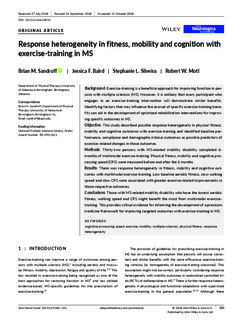Response heterogeneity in fitness, mobility and cognition with exercise‐training in MS
Journal article

Åpne
Permanent lenke
http://hdl.handle.net/11250/2602187Utgivelsesdato
2019Metadata
Vis full innførselOriginalversjon
Sandroff, BM, Baird, JF, Silveira, SL, Motl, RW. Response heterogeneity in fitness, mobility and cognition with exercise‐training in MS. Acta Neurol Scand. 2019; 139: 183– 191. https://doi.org/10.1111/ane.13041Sammendrag
Background: Exercise‐training is a beneficial approach for improving function in per‐sons with multiple sclerosis (MS). However, it is unlikely that every participant who engages in an exercise‐training intervention will demonstrate similar benefits. Identifying factors that may influence the accrual of specific exercise‐training bene‐fits can aid in the development of optimized rehabilitation interventions for improv‐ing specific outcomes in MS.Objective: This study described possible response heterogeneity in physical fitness, mobility and cognitive outcomes with exercise‐training and identified baseline per‐formance, compliance and demographic/clinical outcomes as possible predictors of exercise‐related changes in those outcomes.Methods: Thirty‐two persons with MS‐related mobility disability completed 6‐months of multimodal exercise‐training. Physical fitness, mobility and cognitive pro‐cessing speed (CPS) were measured before and after the 6 months.Results: There was response heterogeneity in fitness, mobility and cognitive out‐comes with multimodal exercise‐training. Low baseline aerobic fitness, slow walking speed and slow CPS were associated with greater exercise‐related improvements in those respective outcomes.Conclusions: Those with MS‐related mobility disability who have the lowest aerobic fitness, walking speed and CPS might benefit the most from multimodal exercise‐training. This provides critical evidence for informing the development of a precision medicine framework for improving targeted outcomes with exercise‐training in MS.